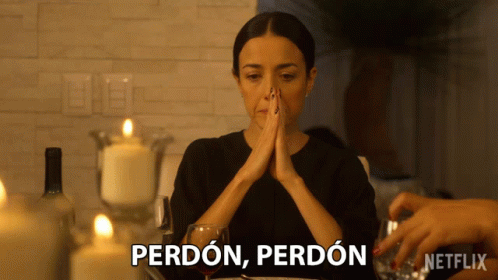¿ Por qué Perdonar? 🤔 | Why Forgive? 🤔
El perdón es un concepto fundamental en la vida humana que ha sido debatido, analizado y practicado a lo largo de la historia por diversas culturas y sociedades. Perdonar es un acto de liberación emocional y psicológica que puede tener profundos efectos en nuestra salud mental y bienestar general. En este texto, exploraremos por qué debemos perdonar, quién se beneficia verdaderamente del acto de perdonar y si la afirmación "perdono pero no olvido" es positiva.

En primer lugar, es importante comprender por qué debemos perdonar a los demás. El perdón es un proceso que implica dejar de lado sentimientos de rencor, ira y resentimiento hacia alguien que nos ha causado algún daño o afrenta. Al perdonar, estamos liberándonos de la carga emocional negativa que llevamos dentro, que puede afectar nuestra salud mental y nuestro bienestar en general. Además, el perdón nos permite liberar la energía que podríamos estar utilizando en el rencor para enfocarla en aspectos más positivos de nuestra vida.

Quien se beneficia del perdón?
Aunque el acto de perdonar puede ser visto como un beneficio para la persona que ha cometido la ofensa, en realidad, el principal beneficiario del perdón suele ser la persona que perdona. Al liberarnos de la carga emocional negativa, estamos permitiéndonos crecer, sanar y avanzar en nuestras vidas de una manera más positiva y constructiva. El perdón nos ayuda a liberar el pasado y a concentrarnos en el presente, permitiéndonos vivir en paz y armonía con nosotros mismos y con los demás.
El perdón nos brinda la oportunidad de practicar la compasión, la empatía y la aceptación. Al perdonar a alguien, estamos reconociendo nuestra propia humanidad y la de los demás, y estamos abriendo la posibilidad de una reconciliación y una relación más saludable en el futuro. El perdón nos permite soltar las ataduras del pasado y mirar hacia adelante con esperanza y positividad.

Perdono pero no olvido.
En cuanto a la afirmación "perdono pero no olvido", es importante analizar su significado y sus implicaciones. Perdonar pero no olvidar puede ser visto como un intento de establecer límites saludables en una relación o de protegernos de futuros daños. Sin embargo, también es importante tener en cuenta que el perdón verdadero implica liberar completamente la carga emocional negativa y permitirnos avanzar sin llevar el peso del pasado a cuestas.
Por lo tanto, aunque perdonar pero no olvidar puede ser un primer paso en el proceso de perdón, es importante seguir trabajando en dejar ir completamente la herida emocional y sanar las cicatrices del pasado. El perdón verdadero nos libera no solo de la carga emocional, sino también de la necesidad de revivir constantemente el dolor pasado.

Si algo vale la pena en esta vida en # perdonar, animo a todos a practicar el perdón en sus vidas, a liberarse de la carga del rencor y a abrir sus corazones a la posibilidad de la reconciliación, la sanación y el amor incondicional. Recuerden que el perdón es un regalo que nos damos a nosotros mismos, y que al perdonar, estamos liberando el poder sanador que reside en nuestro interior.
¡Perdonen, vivan en paz y sean felices!
- Las imágenes me pertenecen
- Traductor: Deelp traslator
- Edicion: Canva
Forgiveness is a fundamental concept in human life that has been debated, analyzed and practiced throughout history by diverse cultures and societies. Forgiveness is an act of emotional and psychological release that can have profound effects on our mental health and overall well-being. In this text we will explore why we should forgive, who really benefits from the act of forgiveness, and whether the statement "I forgive but do not forget" is a positive one.
( )
)
*First, it is important to understand why we should forgive others. Forgiveness is a process that involves letting go of feelings of resentment, anger and resentment towards someone who has caused us harm or affront. By forgiving, we are releasing the negative emotional baggage we carry inside, which can affect our mental health and overall well-being. In addition, forgiveness allows us to release the energy we may be using on resentment to focus on more positive aspects of our life.
( )
)
Who benefits from forgiveness?
Although the act of forgiveness may be seen as a benefit to the person who has committed the offense, in reality, the primary beneficiary of forgiveness is usually the person who is forgiving. By releasing negative emotional baggage, we allow ourselves to grow, heal and move forward in our lives in a more positive and constructive way. Forgiveness helps us to let go of the past and focus on the present, allowing us to live in peace and harmony with ourselves and others.
Forgiveness gives us the opportunity to practice compassion, empathy and acceptance. By forgiving someone, we are acknowledging our own humanity and that of others, and we are opening up the possibility of reconciliation and a healthier relationship in the future. Forgiveness allows us to let go of the ties of the past and look forward with hope and positivity.
( )
)
I forgive but I do not forget
Regarding the statement "I forgive but do not forget," it is important to analyze its meaning and implications. Forgiving but not forgetting can be seen as an attempt to establish healthy boundaries in a relationship or to protect ourselves from future harm. However, it is also important to keep in mind that true forgiveness involves completely letting go of negative emotional baggage and allowing ourselves to move forward without carrying the weight of the past on our shoulders.
Therefore, while forgiving but not forgetting may be a first step in the forgiveness process, it is important to continue working to fully release the emotional wound and heal the scars of the past. True forgiveness frees us not only from the emotional burden, but also from the need to constantly relive the pain of the past.
( )
)
If there is anything worthwhile in this life in #forgiveness, I encourage everyone to practice forgiveness in their lives, to free themselves from the burden of bitterness and open their hearts to the possibility of reconciliation, healing and unconditional love. Remember that forgiveness is a gift we give ourselves and that by forgiving, we are releasing the healing power that resides within us.
Forgive, live in peace and be happy!
- Images belong to me
- Translator: Deepl Traslator
- Editing: Canva
Perdonar es un proceso de sanación que va muy lento y que también depende del dolor.
Tan verdader tus palabras, sin embargo como nos cuesta.
Me gusto mucho. Saludos